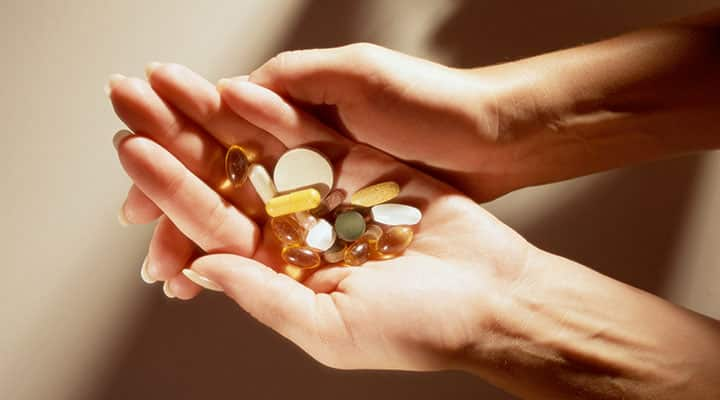
Does B12 Give You Energy?
Published: July 2023
Do you find yourself feeling sluggish and dragging through your day? Perhaps you've noticed you constantly hit the snooze button in the morning because you don't have the energy to get out of bed, that your exercise performance has lagged, or that you're reaching for that extra cup of coffee or energy drink more often than you used to.
Before grabbing another temporary caffeine fix, consider a non-stimulant nutrient known as vitamin B12. Could this vitamin work its magic in your body and boost energy levels? Let's find out!
What is vitamin B12?
Vitamin B12 is an essential, water-soluble nutrient in the B vitamin family. Also known as cobalamin or methylcobalamin, B12 is used by almost every cell in your body, and for so many different functions—from promoting the formation of new red blood cells to maintaining a healthy nervous system and cognitive function. Perhaps most famously, though, B12 has acquired a misguided reputation for its role in supporting healthy energy production.
Does vitamin B12 give you energy?
Whether or not vitamin B12 gives you an energy boost is more complicated than a simple yes or no answer. It does not directly provide energy because it is a vitamin, not a calorie-containing macromolecule (like carbs or fats). However, there are links between how efficiently your body produces energy and your vitamin B12 levels—because although your body draws energy from food, it requires vitamin B12 to produce energy.
Without enough B12 circulating throughout your system, you may feel sluggish, low on power, or simply run down. But with sufficient levels of this nutrient, you'll keep on running like a well-oiled machine!
Other benefits of taking vitamin B12
The health benefits of vitamin B are abundant and extend beyond energy production. Here are more reasons why you want an optimal vitamin B12 intake.
Maintains healthy red blood cell production
—Red blood cells carry oxygen to all parts of your body, so you really need these little guys! And of course, you want enough B12 to have healthy oxygenated red blood cells to keep all of your cells and tissues performing at peak capacity.Supports healthy nervous system function
—Because vitamin B12 is involved in producing cellular energy, it benefits every part of your body, including your brain and peripheral nervous system. So, what does this mean for you? When you don't have sufficient B12 levels, taking this vitamin can help you improve performance, concentration, and an overall better mood! This B vitamin also supports the neurons in your brain to promote healthy memory, especially as you age. In other words, you need sufficient B12 in your bloodstream to concentrate properly and perform at work, at home, and at play. Your nervous system is crucial to your whole life, from the nerves in your eyes and ears down to your fingertips, so ensuring you have sufficient B12 levels really helps you "feel" alive.Nerve-to-muscle communication
—Research also shows that B12 plays a role in maintaining the myelin sheath. This fatty nerve insulator optimizes the signaling from your brain to ensure efficient muscle contractions.Promotes bone health
—When you maintain adequate levels of vitamin B12, you are supporting your bone health, which is especially important as you enter your golden years. B12 has been shown to help your body regenerate bone marrow.Maintains a healthy heart
—Vitamin B12 supports heart health by decreasing the homocysteine levels in your body. Healthy homocysteine levels are necessary to ensure vascular and brain health, too!
How do I get enough vitamin B12?
Your body can't make vitamin B12, so you need to get it from food or other sources—for vegans and strict vegetarians, it's found in a narrow food range. The majority of dietary vitamin B12 comes from animal products, primarily meat, eggs, milk, and dairy products such as yogurt and cheese. Fermented foods such as tempeh, miso, kimchi, sauerkraut, and seaweed are also rich in vitamin B12. Because B12's availability is limited for vegans, you will also find that certain foods such as cereals and nutritional yeast have been fortified with this essential vitamin.
If you are vegan or vegetarian or eat another form of a strictly plant-based diet, it will be essential for you to eat these B12-fortified foods and take a B12 supplement. Since plants are not a B12-rich source, vegans are particularly at risk of not getting sufficient amounts of B12 from diet alone. Pro tip: You can choose high-quality vegan supplement to support your health without compromising your dietary choices.
Can I check my vitamin B12 status?
You sure can! It's as simple as taking a lab test to make sure that you have sufficient amounts of vitamin B12! Regular blood work empowers you to know what's happening behind the scenes of your biology. If your test results show your levels of this vitamin are not where you want them, then it does not necessarily mean you're not consuming enough B12-rich foods (especially if you don't follow vegan or vegetarian diets), rather it may indicate that you are not efficiently absorbing B12. It is always essential that you talk with your doctor, especially before starting any new energy supplement.
Explore Our Best Energy Management Supplements
Who should take vitamin B supplements?
Dietary B12 supplementation can help fill nutritional gaps in the intake of this essential vitamin—so if you take a blood test and discover a deficiency, a high-quality B12 vitamin or B-complex will be vital. It is also vital to boost your B12 intake with supplements if you follow specific dietary restrictions such as veganism.
Additionally, older individuals in particular may benefit from supplements because absorbing less B12 is a normal consequence of aging. This is because absorption of B12 from food and supplements takes place in your gastrointestinal (GI) tract. It requires an enzyme known as intrinsic factor for it to be absorbed by your body. But as you enter your golden years, your stomach produces less intrinsic factor and less stomach acid, both of which are critical for the absorption of B12.
How to take vitamin B12 supplements?
B12 supplements are available in many oral forms, including lozenges, capsules, tablets—you can even get a vitamin B12 injection. Nasal gels or B12 shots are also available, especially if it's challenging for your digestive tract to efficiently absorb vitamin B12. Whatever delivery method you choose, be sure to follow the label instructions carefully for optimal results.
Best supplements to pair with vitamin B12
Clearly, supplementing with vitamin B12 is beneficial for optimal health. But are there combination supplements that can enhance the inherent benefits of B12? Yes!
Here are some of the best supplements to pair with vitamin B12:
Fish oil:
The omega-3s found in fish oil support your nervous system and help B vitamins maintain healthy homocysteine levels in your body.Vitamin B6:
Combining vitamin B12 with B6 is a great combo for maintaining healthy homocysteine levels and supporting nervous system health.Folate:
Vitamin B12 is an excellent partner to folate (seldomly known as B9). And both folate and B12 are important for your homocysteine metabolism and nervous system health.
Notice a bunch of B vitamins on this list? A great option is to choose a B-complex, which includes the full gamut of B vitamins (there are a total of eight!) that your body requires to function optimally.
Can you take too much vitamin B12?
No. Since it is water-soluble, you don't have to worry about consuming too much of this vitamin—any excess will be excreted through urine. And unlike other vitamins, B12 is stored in your liver, which means it can stay in your body for long periods of time. That being said, always follow the instructions on the label, as well as guidance from your doctor or health professional.
You can take this quiz from Life Extenstion to get personalized energy supplement recommendations.
References
- Ankar, A. and A. Kumar. "Vitamin B12 deficiency." National Library of Medicine. October 2022. https://www.ncbi.nlm.nih.gov/books/NBK441923/
- Bito, T. and F. Watanabe. "Seaweeds as a source of vitamin B12." Sustainable Global Resources of Seaweeds. March 2022. https://link.springer.com/chapter/10.1007/978-3-030-92174-3_18
- Calderon-Ospina, C.A. and M.O. Nava-Mesa. "B vitamins in the nervous system: current knowledge of the biochemical modes of action and synergies of thiamine, pyridoxine, and cobalamin." CNS Neuroscience and Therapeutics. January 2020. https://www.ncbi.nlm.nih.gov/pmc/articles/PMC6930825/
- Karger, A.K., et al. "Association between homocysteine and vascular calcification incidence, prevalence, and progression in the MESA cohort." Journal of the American Heart Association. January 2020. https://www.ahajournals.org/doi/10.1161/JAHA.119.013934
- Rizzo, G. and A.S. Lagana. "The link between homocysteine and omega-3 polyunsaturated fatty acid: critical appraisal and future directions." Biomolecules. February 2020. https://www.ncbi.nlm.nih.gov/pmc/articles/PMC7072208/
- Sangle, P., et al. "Vitamin B12 supplementation: preventing onset and improving prognosis of depression." Cureus. October 2020. https://www.ncbi.nlm.nih.gov/pmc/articles/PMC7688056/
- Tardy, A.L., et al. "Vitamins and Minerals for Energy, Fatigue and Cognition: A Narrative Review of the Biochemical and Clinical Evidence." Nutrients. January 2020. https://www.ncbi.nlm.nih.gov/pmc/articles/PMC7019700/
- "Vitamin B12." Data on file.
- "Vitamin B12." National Institutes of Health. July 2021. https://ods.od.nih.gov/factsheets/VitaminB12-Consumer/
Like what you read?
Please subscribe to get email updates on this blog.









